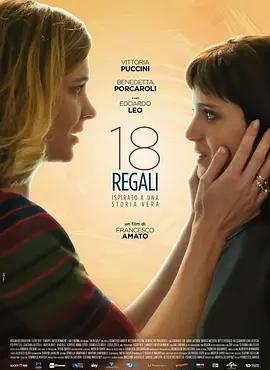From the Spring Festival file is a big hit, "Hello, Li Huanying", which has broken a number of movie records, to the touching "Little Mother" of the main competition of the Berlin Film Festival, to "Eighteen Gifts", which has won multiple nominations for the Italian David Award in 2020... Directors around the world have invariably used the "crossing" technique to tell the deepest emotions and bonds between the two generations. If "Hello, Li Huanying" is a daughter's affectionate review of her mother's past and the background of the era in which she is located, "Little Mother" examines the mental journey experienced by women in her life in the way of returning to childhood, then "Eighteen Gifts" is a more melodramatic narrative style, so that Anna, a girl who has lost her mother since birth, returns to the origin of her life after an accident, and completes the blood reconciliation with her imaginary mother Alyssa.
At the beginning of the film, Alyssa, a forty-year-old pregnant woman, accidentally discovers that she has cancer during a test, and although she can save the fetus, her own life will be in danger after childbirth. She immediately fell into great pain. In order to be able to accompany her flesh and blood to the greatest extent, she began to prepare gifts for every birthday before her daughter reached adulthood in the last hours of her life. It was a huge, time-consuming and laborious project, and it became Alyssa's last wish before she died. Because she knew that her daughter would eventually feel the love from her mother in a strange way during her most rebellious period.

Although the film is titled "Eighteen Gifts", it does not stick to the process of motherhood. After a brief introduction to the background of the story, the film leaps forward to the years when Alyssa is no longer alive, and the girl she conceived in her womb has gradually grown into an adult. Despite living in a loving family, Anna was troubled by the absence of her mother, and by her eighteenth birthday, her conflict with her father escalated, ending in a runaway from home. Negative Anna is in a car accident at the entrance of the tunnel, and the light of the highway is like an umbilical cord leading to a wooden ladder, bringing it to the moment of reunion with her mother, Alyssa. Then, with a lot of shock and surprise, she met her parents eighteen years ago—the same neighborhood, the same house, the same relatives. Anna is like an all-knowing bystander, examining her mother's hardships in September and accompanying her to the arrival of death. In the process of getting along and waiting, Anna gradually understands her mother's personality, enjoys the parent-child time she did not have, and naturally participates in the process of preparing her mother's birthday gifts. In contemplation, she gradually let go of her resentment and actually touched the emotions that she had been deliberately avoiding.
As a popular film, "Eighteen Gifts" has used its brain in narrative structure. For the crossing plot, who crosses? When to cross? To what age? It is often quite a test of screenwriting skills. The film is watertight in its plot setting, and the audience follows Anna to the past and meets Alyssa, who is about to give birth. The relationship between the two has not been broken, from tension to mutual recognition, every small progress is touching. Especially when the plot that occurred before the crossing, such as choosing gifts and frying apple rings, reappeared again, the audience in front of the screen finally had the satisfaction of "waiting for more than ten years and finally unveiling the mystery".
The plot of time and space, the rebirth of the dead represents the director's inner wish to live forever, and the film clearly informs the viewer at the end that the Italian woman who tirelessly prepared eighteen birthday gifts for her daughter despite her serious illness has really existed. The director uses this story to honor the mother's love, and the film itself becomes a tool to lead everyone through time and space, recreating the greatness of the mother. However, after a handful of snot and a handful of tears, the film leaves the audience with no more than the appropriate sensationalism. The reason, perhaps, is that we have seen too many selfless, great, self-sacrificing mothers, and we want them to have a wonderful and fulfilling life, rather than pouring all their energy unconditionally into others, even her dearest daughter. In this sense, perhaps "Eighteen Gifts" can make the audience cry wildly in two hours of movie time with its exquisite structure, but it is still the most mediocre and routine kind of movie.
For more information, please download the 21 Finance APP